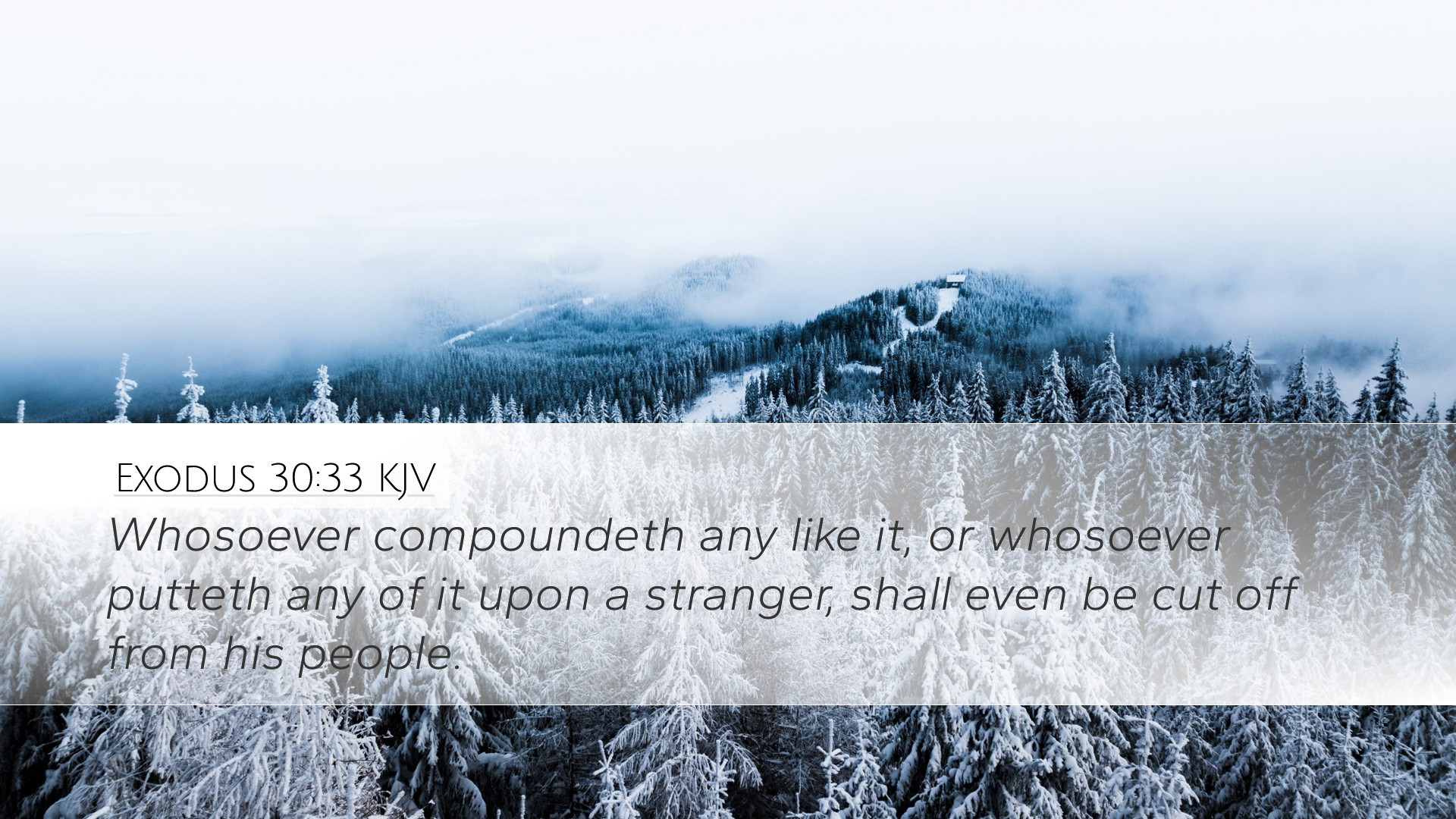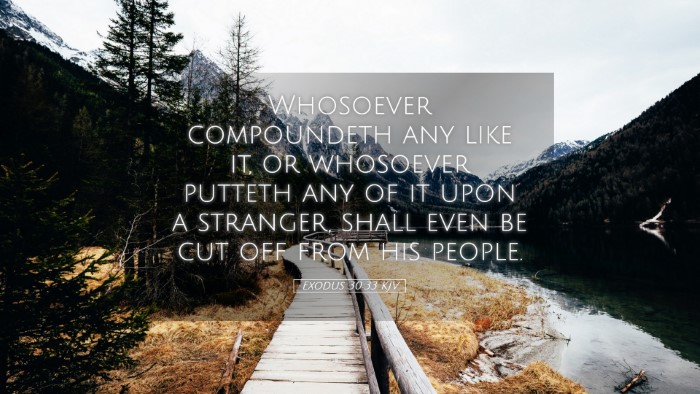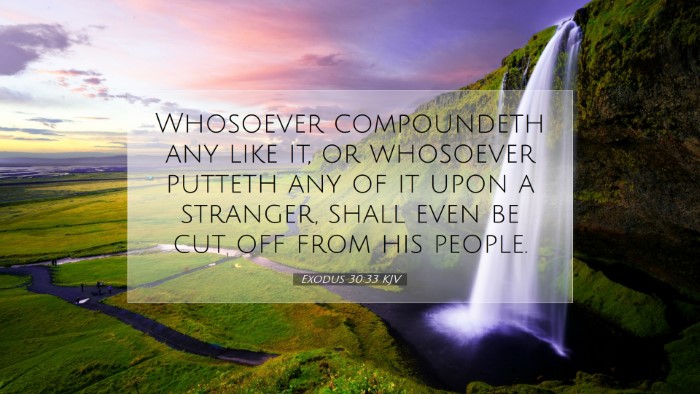Exodus 30:33 Commentary
Verse: "Whosoever compoundeth any like it, or whosoever putteth any of it upon a stranger, shall even be cut off from his people." (Exodus 30:33, KJV)
Introduction
The verse Exodus 30:33 addresses the strict regulations surrounding the sacred anointing oil meant for the Tabernacle and its instruments. This text serves as a warning against unauthorized use or imitation of God's specific commands regarding holy things. In examining this verse through the lenses of esteemed public domain commentaries, we will derive insights pertinent for theological discourse and pastoral application.
Critical Analysis
This prohibition underscores the sanctity of the items used in divine worship and the serious ramifications of misusing them. Both the anointing oil and its intended purpose were divinely instituted; hence, to treat them lightly is to invite grave consequences.
Matthew Henry's Commentary
Henry comments on the matter of propriety surrounding the anointing oil. He emphasizes that God establishes His mercy in salvation by delineating His holy standards.
- Holiness of the Anointing Oil: Henry notes that the oil, made with specific ingredients like myrrh, cinnamon, and calamus, symbolizes divine favor and the empowering presence of the Spirit.
- Exclusivity: He underscores that the oil was not to be imitated or employed for personal or secular use, suggesting that God's anointing is unique and should be revered.
- Severe Consequence: The warning of being "cut off" serves not only as a punishment but echoes the seriousness of being outside God's covenant community. It signifies the consequences of profaning what is holy.
Albert Barnes' Notes
Barnes expands on the notion of the sacred versus the profane, highlighting the principle behind the injunction in Exodus 30:33.
- Divine Specification: Barnes points out that God meticulously specifies the characteristics of items associated with worship, making it clear that His instructions must be followed without deviation.
- Community Cohesion: The concept of being "cut off" relates to the larger social and spiritual fabric of the Israelite community. Barnes suggests that misusing sacred elements disrupts communal holiness and the divine order.
- Historical Context: By examining the consequences highlighted in this verse, Barnes stresses that the laws given were intended not only for enforcement but also for the protection of the community's relationship with God.
Adam Clarke's Commentary
Clarke provides a more detailed reflection on the ramifications of this command, exploring its theological implications.
- Nature of the Offense: Clarke argues that the offense of misusing the anointing oil reflects a misunderstanding of God’s holiness. He perceives this as intertwined with the covenant relationship and underscores that breaking such a command is seen as an act of rebellion against God's order.
- Symbolism of Anointing: Clarke elaborates that anointing oil in Scripture symbolizes not just physical consecration but also spiritual empowerment. Thus, to misapply it is akin to denying the work of the Holy Spirit.
- Modern Application: He warns contemporary believers against trivializing sacred matters. The principle of holiness must remain relevant; the church must guard against the secularization and commodification of what God has set apart.
Theological Implications
From a theological perspective, Exodus 30:33 presents several critical points for further exploration:
- Understanding Holiness: The verse teaches the church the importance of maintaining the distinction between the holy and the profane. Pastors and theologians are called to articulate these distinctions in a world often confused about the sacred.
- Consequences of Irreverence: The consequences of being 'cut off' reflect the nature of divine judgment and communal responsibility. The church must tread carefully, maintaining purity and discipline within its folds.
- Ecclesiastical Authority: This Scripture supports the biblical precedent for ecclesiastical authority in matters of worship and holiness, reinforcing that leaders bear the responsibility for upholding these sacred tenets.
Pastoral Application
For pastors, Exodus 30:33 provides profound insight into addressing issues of holiness, respect for divine ordinances, and the seriousness of worship:
- Teaching on Respect for the Sacred: Pastors should educate congregants on the importance of approaching God with reverence, focusing on the implications of misuse or trivialization of sacred practices.
- Understanding Community Dynamics: The call to community accountability is essential. Leaders must stress the importance of collective adherence to God's statutes, encouraging accountability and reverence among the congregation.
- Encouraging Spiritual Discernment: Pastoral care involves fostering an environment where individuals seek to discern the voice of the Holy Spirit, which includes recognizing the gravity of divine standards concerning worship and life.
Conclusion
Exodus 30:33 serves as a poignant reminder of the sacredness of God’s commands and the seriousness with which we ought to regard them. Through the insights from Matthew Henry, Albert Barnes, and Adam Clarke, this commentary synthesizes not just the historical and contextual significance of the verse but also its relevance for contemporary Christian life. It challenges believers, pastors, and theologians alike to maintain the sanctity of worship and the seriousness of accord with God’s established order.


